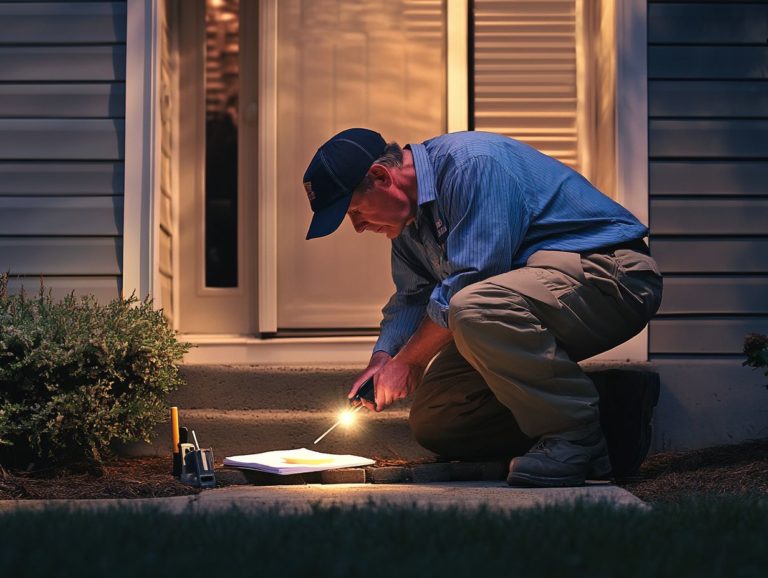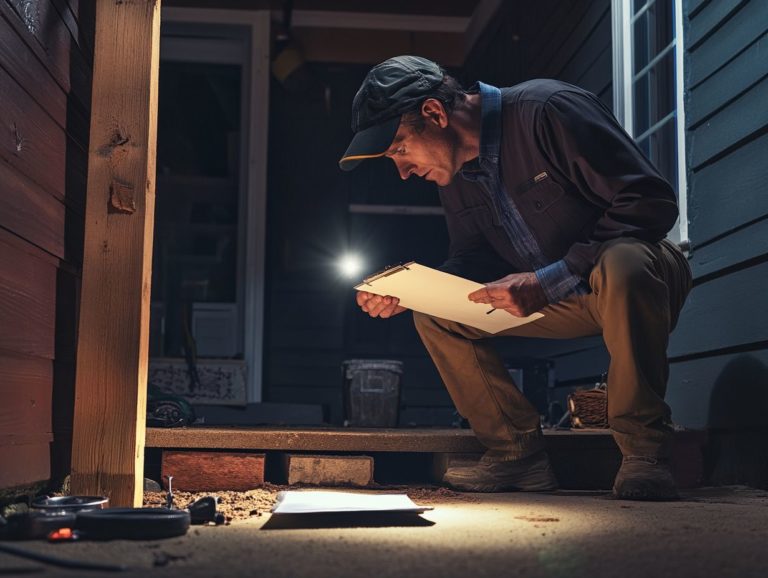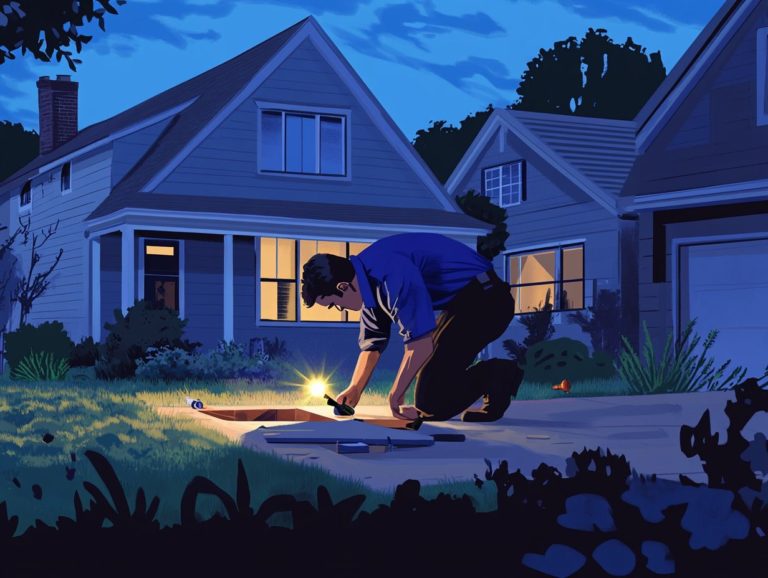How to Choose the Right Inspector for Your Home
When you’re in the market for a home, grasping its condition is vital. This is where home inspections become very important. A comprehensive inspection can uncover hidden issues that could significantly impact your investment.
This article delves into the necessity of home inspections, highlighting key qualities to seek in a home inspector. It also includes essential questions to pose to potential candidates.
It covers effective strategies for researching and comparing inspectors, ensuring you make a well-informed decision for your future home.
Contents
- Key Takeaways:
- Why You Need a Home Inspection
- Qualities to Look for in a Home Inspector
- Questions to Ask Potential Inspectors
- Researching and Comparing Home Inspectors
- Frequently Asked Questions
- What qualifications should I look for in a home inspector?
- What should I ask a potential home inspector before hiring?
- Is it necessary to attend the home inspection?
- What should I do if I am not satisfied with the inspection report?
- How long does a home inspection usually take?
- Can I use the home inspection report for negotiations?
Key Takeaways:
A home inspection is crucial for identifying potential issues in a property before purchasing it.

When choosing a home inspector, make sure to consider their experience, attention to detail, and communication skills.
Research and compare potential inspectors by reading online reviews, asking for recommendations, and checking how to select a home inspector for your needs, including the services offered.
Why You Need a Home Inspection
Home inspections play an essential role in the home buying and selling journey. They act as your first line of defense against potential hidden issues that could jeopardize the safety and integrity of a property.
By engaging a qualified inspector, you gain invaluable insights into the property s condition. This allows you to address any issues with systems like heating and cooling before finalizing negotiations.
This proactive strategy not only brings you peace of mind but also protects your investment when purchasing a house or condominium.
The Role of a Home Inspector
A home inspector plays a pivotal role in the inspection process by providing a thorough evaluation of the property and delivering a detailed inspection report tailored for you.
Leveraging their expertise, the inspector conducts meticulous visual checks of various systems, including the roof, plumbing, and electrical components. They may also carry out specialized testing for hazardous materials like radon and lead, which can pose significant health risks.
This comprehensive approach ensures that all potential issues are documented, enabling you to make informed decisions. The significance of a detailed inspection report cannot be overstated it serves not only as a record of findings but also as a crucial negotiating tool in your home-buying journey.
Qualities to Look for in a Home Inspector
When selecting a home inspector, it’s essential to consider several key qualities that will help you choose a reliable professional. For guidance, refer to this article on how to choose the right inspector for your home, which can assist you in effectively meeting your inspection needs.
Seek inspectors with credible certification, ongoing training, and a track record of positive customer reviews. Additionally, understanding how to choose the right real estate agent can greatly impact the quality of the inspection services they offer.
Trusted references from real estate agents and previous clients can further bolster your confidence in their expertise.
Experience and Credentials
When you’re on the hunt for a home inspector, experience and credentials are key factors to consider. Additionally, you might want to explore how to choose the right real estate agent for you, as they can guide you through the process and help ensure you find a trustworthy inspector.
Certifications from reputable organizations like the American Society of Home Inspectors and the International Association of Certified Home Inspectors serve as a strong testament to an inspector s commitment to exceptional professional standards.
These credentials not only showcase an inspector’s skill in pinpointing potential issues within a property but also underscore their dedication to continuous education, keeping them informed about the latest building codes and industry practices.
Choosing an inspector with these esteemed qualifications allows you to invest in your new home with confidence. Knowing how to spot a good home inspector signifies a higher level of expertise and professionalism that benefits your purchase.
Attention to Detail

Attention to detail is paramount for you as a home inspector; it enables you to uncover hidden issues that might elude a standard visual check.
When you take the time to carefully check every part of a property, you re not just spotting superficial flaws. You re diving deeper to identify underlying problems, like plumbing leaks or electrical hazards, which might be missed without thorough scrutiny.
This thorough approach helps you give accurate repair quotes, ensuring that prospective buyers are well-informed. Failing to notice these hidden issues can have significant repercussions down the line.
It affects not only the immediate safety and integrity of the home but could also derail the buying process altogether.
Future complications might arise that could have been addressed upfront, leaving everyone involved in a tougher situation than necessary.
Communication Skills
Strong communication skills are critical for you as a home inspector, as you need to convey the findings of your inspection report clearly to both homebuyers and sellers.
This communication goes beyond simply relaying the details of any issues you uncover; it also includes addressing any questions that the homebuyer might have. Engaging in clear discussions about the inspection results enables buyers to grasp the implications of those findings on their potential purchase.
When both parties engage in open communication, the negotiation process becomes more streamlined, leading to more productive conversations about repairs or price adjustments.
Ultimately, effective communication fosters a deeper understanding, helping to resolve concerns and facilitating smoother transactions, ensuring that everyone involved feels informed and satisfied with the outcome.
Questions to Ask Potential Inspectors
When you’re interviewing potential home inspectors, asking the right questions is crucial! It helps you understand their services and how to find reliable home inspection services to know what to expect during the inspection process.
What is Included in the Inspection?
Understanding the ins and outs of a home inspection is crucial for you as a homebuyer, as it clearly defines the scope of services provided by the inspector.
A thorough analysis typically covers several vital components, including structural integrity, mechanical systems, and potential environmental hazards. Inspectors will scrutinize issues such as foundation cracks, roof conditions, and plumbing functionality to ensure the home is both safe and sound.
Comprehensive inspections may also involve specialized tests for radon (a harmful gas) and mold (which can cause health issues) to ensure your new home is safe. To make an informed decision, you should definitely inquire about the specifics of these inspections when speaking with potential inspectors.
Grasping the depth and breadth of the services offered can lead to a more secure investment in your future home.
How Long Will the Inspection Take?
The duration of a home inspection can vary significantly based on the size of the property and the thoroughness of the inspection process you choose.
For instance, if you’re looking at a small condominium, expect a comprehensive examination to take about one to two hours. However, a larger single-family home could require anywhere from three to five hours of careful inspection.
Factors such as the property’s age, its condition, and any unique features can also extend the timeframe. If specific systems, like plumbing or electrical wiring, demand a closer look, you might find the inspection taking even longer.
Keep in mind that this extended duration often influences the overall cost of the home inspection, as professionals typically charge based on the time and resources they commit to ensuring a meticulous evaluation.
Can I Attend the Inspection?

Many homebuyers wonder if they can attend the home inspection. Generally, the answer is yes!
Being present allows you to ask questions and understand the inspection process as it happens.
Seeing the property’s condition firsthand provides insights that a written report cannot convey.
Engaging with the inspector lets you clarify uncertainties about repairs or maintenance issues immediately. This interaction builds trust and equips you with valuable knowledge for negotiations.
By participating in the inspection, you gain critical information, helping you make informed decisions about your investment.
Researching and Comparing Home Inspectors
Researching and comparing home inspectors is a vital step in your home-buying journey.
Look at online reviews and trusted recommendations to find qualified professionals that meet your needs.
Online Reviews and Recommendations
Online reviews are crucial when selecting a home inspector. They provide valuable insights from previous clients about their experiences.
Using various online platforms can enhance your selection process. Customer feedback websites offer honest evaluations, helping you recognize the strengths and weaknesses of potential inspectors.
Seeking recommendations from trusted sources adds reliability to your choice. The Better Business Bureau is a great resource to verify an inspector s credibility and assess their standing in the industry.
By leveraging these platforms, you can make decisions that lead to a more satisfactory home inspection experience.
Price and Services Offered
Understanding the prices and services of home inspectors is essential for informed decision-making.
Factors like the size and age of the property can significantly influence inspection costs. Larger homes require more extensive evaluations, impacting time and resources.
If you re considering specialized tests like radon or mold assessments, these may incur extra charges.
Therefore, getting a detailed quote from inspectors beforehand is crucial. This ensures clarity on the services provided and helps you budget for the entire home-buying process.
Ultimately, this approach guarantees comprehensive evaluations tailored to your property.
Frequently Asked Questions
What qualifications should I look for in a home inspector?

When choosing a home inspector, check their qualifications and experience. Look for licensed and certified inspectors who have experience in your home’s area, and consider consulting resources like how to choose the right inspector for your needs.
It s also wise to check for additional certifications, such as those for radon or termite inspections.
What should I ask a potential home inspector before hiring?
Before hiring, ask about their experience, qualifications, and services offered. Request references from previous clients and inquire about their availability and pricing to determine if they’re a good fit for your needs and budget.
Is it necessary to attend the home inspection?
While it is not required, attending the home inspection is highly recommended.
This allows you to see firsthand any potential issues the inspector may find. You can also ask questions and better understand the inspection process.
What should I do if I am not satisfied with the inspection report?
If you are not satisfied with the inspection report, discuss your concerns with the inspector.
They can provide clarification or suggest additional inspections. You can also seek a second opinion from another qualified home inspector.
How long does a home inspection usually take?
The length of a home inspection varies based on the size, age, and condition of the home.
On average, it takes 2-3 hours. Larger or more complex homes may require more time.
Can I use the home inspection report for negotiations?
Yes, you can capitalize on the home inspection report to negotiate with the seller!
If major issues are found, request that they be addressed or negotiate for a lower price. Discuss this with your real estate agent for assistance.






